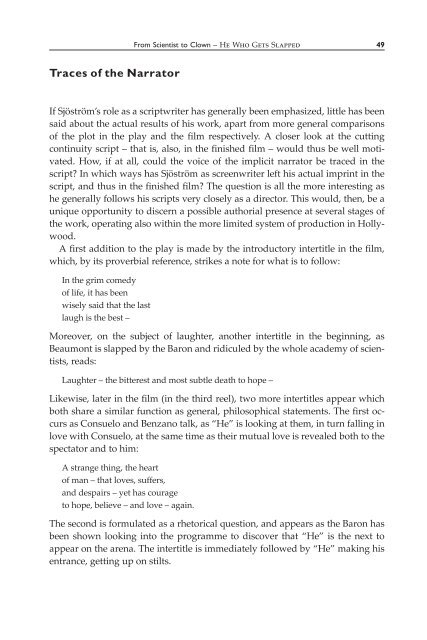FILM FILM - University of Macau Library
FILM FILM - University of Macau Library
FILM FILM - University of Macau Library
You also want an ePaper? Increase the reach of your titles
YUMPU automatically turns print PDFs into web optimized ePapers that Google loves.
Traces <strong>of</strong> the Narrator<br />
If Sjöström’s role as a scriptwriter has generally been emphasized, little has been<br />
said about the actual results <strong>of</strong> his work, apart from more general comparisons<br />
<strong>of</strong> the plot in the play and the film respectively. A closer look at the cutting<br />
continuity script – that is, also, in the finished film – would thus be well motivated.<br />
How, if at all, could the voice <strong>of</strong> the implicit narrator be traced in the<br />
script? In which ways has Sjöström as screenwriter left his actual imprint in the<br />
script, and thus in the finished film? The question is all the more interesting as<br />
he generally follows his scripts very closely as a director. This would, then, be a<br />
unique opportunity to discern a possible authorial presence at several stages <strong>of</strong><br />
the work, operating also within the more limited system <strong>of</strong> production in Hollywood.<br />
A first addition to the play is made by the introductory intertitle in the film,<br />
which, by its proverbial reference, strikes a note for what is to follow:<br />
In the grim comedy<br />
<strong>of</strong> life, it has been<br />
wisely said that the last<br />
laugh is the best –<br />
Moreover, on the subject <strong>of</strong> laughter, another intertitle in the beginning, as<br />
Beaumont is slapped by the Baron and ridiculed by the whole academy <strong>of</strong> scientists,<br />
reads:<br />
Laughter – the bitterest and most subtle death to hope –<br />
Likewise, later in the film (in the third reel), two more intertitles appear which<br />
both share a similar function as general, philosophical statements. The first occurs<br />
as Consuelo and Benzano talk, as “He” is looking at them, in turn falling in<br />
love with Consuelo, at the same time as their mutual love is revealed both to the<br />
spectator and to him:<br />
A strange thing, the heart<br />
<strong>of</strong> man – that loves, suffers,<br />
and despairs – yet has courage<br />
to hope, believe – and love – again.<br />
From Scientist to Clown – He Who Gets Slapped 49<br />
The second is formulated as a rhetorical question, and appears as the Baron has<br />
been shown looking into the programme to discover that “He” is the next to<br />
appear on the arena. The intertitle is immediately followed by “He” making his<br />
entrance, getting up on stilts.

















